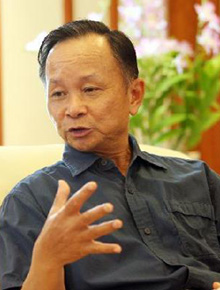Diplomat: China must avoid tug-of-war with the US
- By Wu Jin
 0 Comment(s)
0 Comment(s) Print
Print E-mail China.org.cn, March 13, 2012
E-mail China.org.cn, March 13, 2012
Unfazed by the U.S.'s blunt strategic refocus in the Asia-Pacific Region and its apparent goals in forging a clout against the world's fastest growing economies, a veteran Chinese diplomat said China will remain consistent in its foreign policies of non-interventionism and good neighborly relations.
|
|
|
Zhang Jiuhuan, a CPPCC member and former Chinese ambassador to Singapore and Thailand. [File Photo] |
"Current events in Asia-Pacific are merely a prelude to a changing situation in the region which would probably be shaped over a century," said Zhang Jiuhuan, a CPPCC member and former Chinese ambassador to Singapore and Thailand. "It requires China to look at the long term big picture, and not be affected by temporary disturbances."
China already faces delicate situations in territorial disputes in the South China Sea and Diaoyu Island. Yet the involvement of the U.S., brought front-and-center by U.S. Secretary of State Hillary Clinton's visit to South Asia and U.S. President Barack Obama's projected deployment of 2,500 Marines to Australia, is complicating things even further.
Obama has more than once stressed the importance of the Asia Pacific Region to his country, saying it is now a "top priority" of U.S. security policy. Although the U.S. has cut its Pentagon budget amid sagging domestic economy, Obama said: "The reduction of U.S. defense spending will not come at the expense of the Asia-Pacific."
The military strategy only represents one part of the shifting U.S. strategy toward the Asia Pacific. Its stimulus for the expansion of Trans-Pacific Strategic Economic Partnership (TPP), which may cause the influence of Asia Pacific Economic Cooperation (APEC) to wane, is now in its full swing with impending negotiations with Japan. Furthermore, its alternative sanction and conciliation with South Asian countries, such as Vietnam and Burma, are leveraging the countries' ongoing political reforms. The Burmese Aung San Suu Kyi's election for a seat in Burma parliament is one such example.
"We called the U.S. political move as ‘color infiltration,'" said Zhang. "The United States is trying to encircle China with its economic, political and military strategies."
However, Obama denied these recent policies were containment policies against China in an interview with Time magazine in January. He said that he "specifically rejected that formulation" that Chinese scholars have put forth suggesting recent U.S. diplomatic activities were to contain China. He explained that his strategies are made to persuade China to "play by the same rules."
Contrary to Time's compliment for Obama's talents as a diplomatic strategist, Chinese diplomats and scholars believe his policies are nothing different from those of his predecessors.
"His current Asia Pacific strategy was planned as early as 10 years ago by a group of think-tank in the U.S. government," said Zhang. "However, the devastating Sept. 11 attack shifted [former U.S. President George W.] Bush's attention to anti-terrorist fights."
With China's decade-long peaceful rise that made it into the world's second largest economy, the U.S. redirected its attention after withdrawing its military forces from Iraq and Afghanistan. But Sino-U.S. relations expert Jin Canrong said the U.S. is currently financially incapable of realizing its ambitions.
The associate dean of Renmin University's School of International Studies said the U.S. displeased the Burmese government with its unfulfilled commitment of a financial assistance worth US$10 billion.
"The U.S. only fulfilled US$1.23 million [of the sum], and many of the funding was channeled to the oppositions," he said. "How would the Burmese government be pleased with that?"
Jin also took Singaporean Foreign Minister K. Shanmugam 's recent remark as an example that Asia is cautious in dealing with the U.S.'s high-profile "pivot."
Shanmugam raised a warning against anti-China rhetoric during his recent tour to Washington, saying, "Such rhetoric can spark reactions that [would create] a new and unintended reality in the region."
"Containment does not work, will not work…once you get into Cold War rhetoric, then you get everyone else into a Cold War framework," he said.
Shanmugam's remarks were particularly applauded by China, who reiterated its peaceful development as well as its consistent foreign policies.
As a former ambassador to Singapore, Zhang said Singapore pays special attention to the balance of power in the world.
When referring to China's countermeasures to the U.S.'s current belligerence, Zhang said the struggle would always be there, but so would the cooperation.
"We need to look at foreign relations in a rational and panoramic view, keeping on our development without being interfered," he said. "Any furious retaliation stirred up by temporary insults is worthless and unwise."






